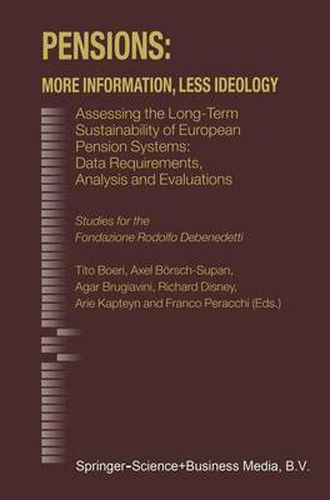Readings Newsletter
Become a Readings Member to make your shopping experience even easier.
Sign in or sign up for free!
You’re not far away from qualifying for FREE standard shipping within Australia
You’ve qualified for FREE standard shipping within Australia
The cart is loading…






This title is printed to order. This book may have been self-published. If so, we cannot guarantee the quality of the content. In the main most books will have gone through the editing process however some may not. We therefore suggest that you be aware of this before ordering this book. If in doubt check either the author or publisher’s details as we are unable to accept any returns unless they are faulty. Please contact us if you have any questions.
Europeans are living longer, and fewer now remain in the labour force as they grow older. Many European countries have responded to the ensuing financial pressure by reforming their public pension systems and health care programmes. There is considerable uncertainty as to the effects of these reforms - as they typically do not alter the unfunded nature of public welfare arrangements and this uncertainty is itself costly. Not only does it undermine the credibility of public welfare programmes, but it may also distort labour supply behaviour, decisions regarding savings and capital accumulation. More generally there is uncertainty about the overall impact of ageing on welfare and society and the multiple domains in which its effects may develop. Pensions: More Information, Less Ideology builds on the existing evidence - mostly in the field of public pensions - and highlights the advantages that would be obtained by: harmonising methodologies used in the various countries to report pension outlays and forecast future pension liabilities or more generally public spending; defining common standards as to the frequency of expenditure forecasts and the length of the forecast horizons for welfare expenditures; developing European longitudinal survey of persons pre- and post retirement age, providing timely information on a wide array of decisions by individuals and household related to the ageing process and the ongoing trends.
$9.00 standard shipping within Australia
FREE standard shipping within Australia for orders over $100.00
Express & International shipping calculated at checkout
This title is printed to order. This book may have been self-published. If so, we cannot guarantee the quality of the content. In the main most books will have gone through the editing process however some may not. We therefore suggest that you be aware of this before ordering this book. If in doubt check either the author or publisher’s details as we are unable to accept any returns unless they are faulty. Please contact us if you have any questions.
Europeans are living longer, and fewer now remain in the labour force as they grow older. Many European countries have responded to the ensuing financial pressure by reforming their public pension systems and health care programmes. There is considerable uncertainty as to the effects of these reforms - as they typically do not alter the unfunded nature of public welfare arrangements and this uncertainty is itself costly. Not only does it undermine the credibility of public welfare programmes, but it may also distort labour supply behaviour, decisions regarding savings and capital accumulation. More generally there is uncertainty about the overall impact of ageing on welfare and society and the multiple domains in which its effects may develop. Pensions: More Information, Less Ideology builds on the existing evidence - mostly in the field of public pensions - and highlights the advantages that would be obtained by: harmonising methodologies used in the various countries to report pension outlays and forecast future pension liabilities or more generally public spending; defining common standards as to the frequency of expenditure forecasts and the length of the forecast horizons for welfare expenditures; developing European longitudinal survey of persons pre- and post retirement age, providing timely information on a wide array of decisions by individuals and household related to the ageing process and the ongoing trends.